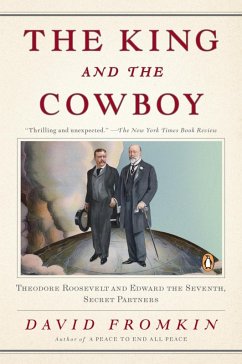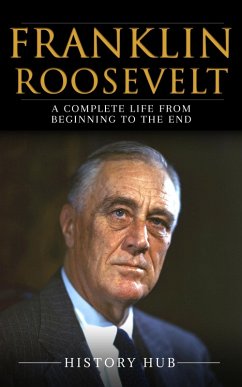
King Edward VI: Discover Life Legacy From Beginning To End (eBook, ePUB)

PAYBACK Punkte
0 °P sammeln!
He was born on October 12, 1537, and became one of England's most interesting young kings. Faith in Tudor England changed a lot while he was king for a short time. Henry VIII and Jane Seymour had no other sons, so when he was born, it finished their long search for a boy to become king. The young prince's early years were tainted by the death of his mother only twelve days after he was born. However, his intellectual brilliance would soon be shown through his mastery of Greek and Latin and his detailed records of his rule. When Edward's father died in January 1547, he took the throne at the yo...
He was born on October 12, 1537, and became one of England's most interesting young kings. Faith in Tudor England changed a lot while he was king for a short time. Henry VIII and Jane Seymour had no other sons, so when he was born, it finished their long search for a boy to become king. The young prince's early years were tainted by the death of his mother only twelve days after he was born. However, his intellectual brilliance would soon be shown through his mastery of Greek and Latin and his detailed records of his rule.
When Edward's father died in January 1547, he took the throne at the young age of nine. This started a new era of Protestant reformation that would drastically change England. Because he was so young, his coronation at Westminster Abbey required a specially made crown. This showed how difficult his rule would be. While still young, Edward showed a lot of intellectual ability and religious belief. He embraced Protestant ideas with more zeal than his father's religious reforms.
During Edward's childhood, England was run by a council of regents, which was first led by his uncle Edward Seymour, Duke of Somerset, and then by John Dudley, Duke of Northumberland. They shaped politics and religion during Edward's rule by putting in place the Book of Common Prayer in 1549 and ending Catholic practices, among other things. Things changed a lot in England's social and economic life while they were in charge. There were rebellions and costly wars with Scotland and France. Even though he was young, Edward VI was a very involved king. He kept detailed diaries that are very helpful for understanding how Tudor government worked. Leading humanist scholars were in charge of his schooling, which made him a very smart young king who was very interested in both state and religious issues. Edward's personal commitment to Protestant ideas helped change the Church of England into a clearly Protestant organization. He laid the groundwork for religious life in England that would last for hundreds of years.
Because he had tuberculosis, the young king's reign was sadly cut short. He died on July 6, 1553, at the age of fifteen. In his last acts, he mostly focused on trying to get a Protestant succession through his cousin Lady Jane Grey, but this plan failed in the end. Edward VI had a huge effect on English history, even though he was only king for six years. He made Protestantism the official religion of the country and set the stage for the Elizabethan religious settlement that would define England's religious identity for generations to come.
When Edward's father died in January 1547, he took the throne at the young age of nine. This started a new era of Protestant reformation that would drastically change England. Because he was so young, his coronation at Westminster Abbey required a specially made crown. This showed how difficult his rule would be. While still young, Edward showed a lot of intellectual ability and religious belief. He embraced Protestant ideas with more zeal than his father's religious reforms.
During Edward's childhood, England was run by a council of regents, which was first led by his uncle Edward Seymour, Duke of Somerset, and then by John Dudley, Duke of Northumberland. They shaped politics and religion during Edward's rule by putting in place the Book of Common Prayer in 1549 and ending Catholic practices, among other things. Things changed a lot in England's social and economic life while they were in charge. There were rebellions and costly wars with Scotland and France. Even though he was young, Edward VI was a very involved king. He kept detailed diaries that are very helpful for understanding how Tudor government worked. Leading humanist scholars were in charge of his schooling, which made him a very smart young king who was very interested in both state and religious issues. Edward's personal commitment to Protestant ideas helped change the Church of England into a clearly Protestant organization. He laid the groundwork for religious life in England that would last for hundreds of years.
Because he had tuberculosis, the young king's reign was sadly cut short. He died on July 6, 1553, at the age of fifteen. In his last acts, he mostly focused on trying to get a Protestant succession through his cousin Lady Jane Grey, but this plan failed in the end. Edward VI had a huge effect on English history, even though he was only king for six years. He made Protestantism the official religion of the country and set the stage for the Elizabethan religious settlement that would define England's religious identity for generations to come.
Dieser Download kann aus rechtlichen Gründen nur mit Rechnungsadresse in A, B, CY, CZ, D, DK, EW, E, FIN, F, GR, H, IRL, I, LT, L, LR, M, NL, PL, P, R, S, SLO, SK ausgeliefert werden.













